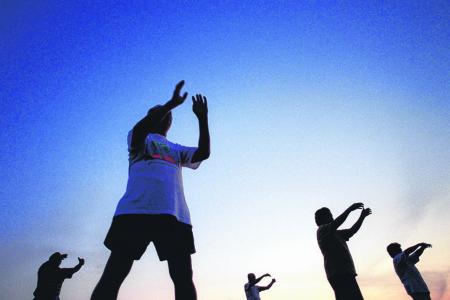Almost any amount of exercise may help older men win longevity race
Getting active will help older men live longer, and it doesn't even require a huge amount of exercise, a study in the UK suggests.
Researchers asked 1,655 men between 71 and 92 years old, to wear accelerometers for one week to assess activity levels.
Among a subset of 1,274 men without cardiovascular disease or heart failure who wore the accelerometers, participants logged a daily average of 616 minutes of sedentary time, 199 minutes of light activity and 40 minutes of moderate to vigorous exercise.
There were 194 deaths in this group in the six years following up on the study. For each additional 30 minutes of sedentary time, men were 17 per cent more likely to die, researchers report in the British Journal of Sports Medicine.
Every extra half hour of light activity, however, was associated with 17 per cent lower odds of death.
"For those who are able, it remains a good idea to aim for at least 150 minutes each week of moderate or more intense activity, that is, activities that get the heart beating faster," said lead study author Barbara Jefferis of University College London.
"Our results suggest that while moderate or more intense activity is best, for older men who are unable to achieve the target, even light physical activity is worthwhile," she said.
Researchers also found that men were about 40 per cent less likely to die during the study when they got the minimum recommended 150 minutes of moderate to vigorous exercise each week, compared to men who didn't.
And the good news is that "as long as men accumulated 150 minutes of moderate to vigorous activity per week, it didn't matter whether it was in long or short bursts", said Dr Jefferis.
"This is encouraging for older adults, as it is easier for them to reach the target ."
However, the study wasn't designed to prove whether or how the amount or duration of exercise men get might directly impact longevity.
Another limitation is that the accelerometers didn't distinguish between standing time and sitting, which may have different health results.
Still, the results add to evidence that any exercise is better than none, even if more intense activity is better, said Dr Keith Diaz, a researcher at Columbia University Medical Center in New York City, who wasn't involved in the study.
"Regular exercise can lower blood pressure, blood sugar levels, body weight, triglycerides, and unhealthy LDL cholesterol; all of which can improve your heart's health and, in turn, longevity," Dr Diaz added.
"Exercise can also help memory and thinking by stimulating the release of chemicals in the brain that affect the health of brain cells and the growth of new blood vessels in the brain." - REUTERS
Get The New Paper on your phone with the free TNP app. Download from the Apple App Store or Google Play Store now



